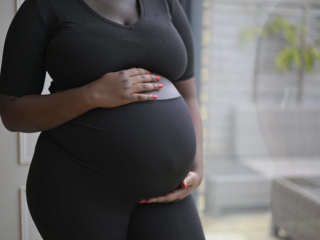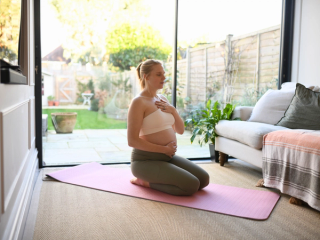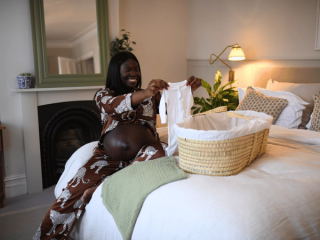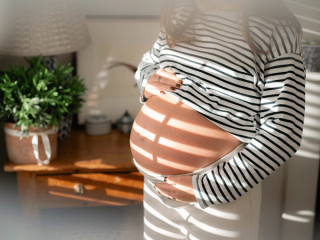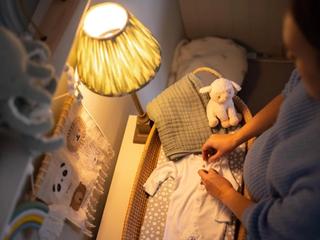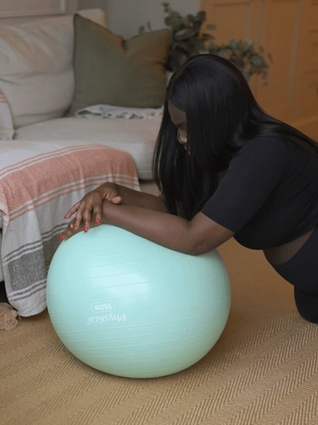
- Home
- Advice Hub
- Pregnancy
- Labour & Birth
- Early Signs Of Labour
Early signs of labour
Discover the early signs of labour to help you prepare for your baby's arrival. Learn about physical and emotional changes that indicate labour is approaching.
If you’re in the late stages of pregnancy, you might be wondering how you will know when you have gone into labour.
Forget what you might have seen on television and in films, most births don’t start with a huge gush of water, crippling pains and a dramatic rush to hospital. Many women find their labour starts much more slowly – but there are signs to look out for to show that things have started moving.
For most women, labour begins anywhere between 37-42 weeks of pregnancy, with the vast majority giving birth between 39-41 weeks. All women are different and there is no way of telling when you will go into labour. There are however, common signs your body is getting ready for labour.
What is labour?
Labour is the process in which your body goes through numerous changes, leading to the birth of your baby. It typically begins when your body starts experiencing regular contractions that help your cervix to dilate and thin out in preparation for the baby's delivery.
This process occurs in stages, starting with early labour, where you may feel mild, irregular contractions, progressing to active labour when contractions become stronger, longer, and closer together as your cervix opens fully to approximately 10 centimetres. Once fully dilated, the second stage begins, where you'll push with the contractions to help guide your baby through the birth canal and out into the world.
After your baby is born, the third stage of labour takes place, which is the delivery of the placenta. Although contractions continue, they are usually less intense, and this phase is typically much shorter, lasting just a few minutes to half an hour. Labour can vary greatly from one person to another, lasting anywhere from a few hours to more than a day, but it is the natural process that brings your baby into your arms.
Signs labour is near but hasn’t started yet
There are some changes that can occur in the days leading up to labour including:
Mucus Plug comes away
The mucus plug seals the cervix during pregnancy to prevent infection. As the cervix begins to dilate, this plug may be expelled, sometimes accompanied by a small amount of blood (the ‘bloody show’). The discharge can be thick, clear, pinkish, or slightly bloody. A bloody show may typically occur at the start of labour but the mucous plug itself may come away days before hand.
Nesting Urge
Some women experience a burst of energy and the desire to clean, organise, or prepare the home for the baby, also known as "nesting." This is usually an instinctual behaviour and can happen in the days leading up to labour.
Diarrhoea or Loose Stools
As labour nears, your body releases hormones like prostaglandins, which can loosen the bowels and lead to diarrhoea.
Lightening ("Baby Dropping")
This is when the baby moves down into the pelvis in preparation for birth. You may notice your belly looks lower, and it might be easier to breathe as the baby moves away from the diaphragm. There may be increased pressure on the bladder, leading to more frequent urination.
What are the early signs of labour?
Early signs of labour vary from person to person. You may start to experience some contractions or feel like your bump is tightening. This can feel very similar to Braxton Hicks – the practice contractions many women experience in the later stages of pregnancy.
Braxton Hicks contractions tend to last less than 30 seconds and while they may feel uncomfortable, they are usually not painful. However, if it is labour, the contractions will last for longer before they die away – usually between 30 and 70 seconds – and they will continue at regular intervals until your baby is born.
The pain will usually feel like a wave, and will be mild at the beginning before growing in intensity and then ebbing away. If you have been experiencing contractions regularly for more than an hour, it is possible that this is the start of labour rather than Braxton Hicks. However, labour is unpredictable and things can tend to stop and start.
Aside from Braxton Hicks contractions, there are other signs which could mean that baby is on the way:
- Waters Breaking: The amniotic sac may rupture, causing a trickle or gush of fluid. This is a key sign that labour is near or has begun.
- Backache and Cramps: A persistent dull backache, often felt in the lower back, can signal early labour. You may also feel menstrual-like cramps or discomfort in the lower abdomen.
Not all women experience obvious contractions in the early stages of labour. You may feel like you have period pains, your back might ache, and you may feel pressure in your pelvis.
You might feel like you need to go to the toilet urgently – this is usually because your baby’s head is pushing down on your bowel. When you do go to the toilet, you might notice some bloody mucus in your underwear. This is often called a ‘show’ and is the plug of mucus that had been blocking your cervix, which is coming away ready for your baby to be born.
What should I do during the early stages of labour?
The early stages of labour can take a long time and pass slowly. There is no rush to do anything at all if your baby is full-term (past 37 weeks of pregnancy) and you feel comfortable at home.
For some women, the beginning of labour can take many hours and even days. During this latent stage of labour, your cervix is starting to soften and thin, in preparation for your baby being born.
You may want to take a bath or shower to help you manage the pain. Try to make yourself as comfortable as you can and rest, as you will need your strength for the birth.
You may want to get in touch with your birth partner if they are not already with you, so they know your labour is starting and they can offer you help and support.
Try to keep upright and moving and walk around if you can. Sometimes early labour can stop and start, but keeping active can get baby moving again.
Make sure you are drinking plenty of fluids so you don’t become dehydrated and try to eat what you can – having some easy, healthy snacks on hand will help. You may want to try some relaxation and breathing exercises to help you manage the pain. Some women find a back-rub comforting.
When should I call my midwife?
Your midwife should have discussed the plan with you regarding who and when to call when you go into labour. You may have a number to call to speak to the maternity unit at the hospital or you may have been told to contact your community midwife if you are planning a home birth.
If you are more than three weeks away from your due date, call your midwife if you experience any of the signs of early labour, as this could mean your baby will be premature. If your pregnancy has reached full term (37 weeks), you don’t have to tell your midwife the moment you think your labour might have started.
In the weeks before your labour starts have a think of all the nice things you could do to distract yourself. Yoga, movies, gentle walks, and baking cakes are all nice ways to pass the time. Being relaxed will promote the release of that all-important oxytocin, which is needed to fuel your contractions.
The decision to call your midwife or go into hospital or birth centre is best based on how you are feeling. If you are able to carry on with similar activities to above then probably best to relax and stay at home. If, however, you feel you want additional support or pain relief, give your maternity unit a call. Counting contractions is only likely to make you anxious and there really isn’t any need to do so.
Before calling the hospital, take about 10 minutes to count your contractions. This will help you communicate to the midwife when they became more intense—typically when you're unable to focus on other activities. Make sure to let your midwife know how many contractions you've experienced in the last 10 minutes.
You should also contact your midwife if you think your waters have broken, especially if the fluid is coloured or there is a smell. If you are losing blood or you have noticed a change in your baby’s movements, it is important to talk to your midwife and get medical advice as soon as you can.
Don’t be afraid to ask for advice if there is anything you feel worried or unsure about. Your midwife will be happy to check everything is ok. She may ask you if your baby is moving normally and to describe the way you are feeling. You may also be asked to come in for an examination or to be monitored.
Labour looks different for everyone. You may hear labour and birth stories from others and wonder why things might be happening faster or slower than theirs. We are all unique individuals and your baby’s birth will be an experience unique to you.
Frequently asked questions about labour
Preterm labour occurs when a pregnant woman experiences regular contractions that lead to changes in the cervix, such as thinning or dilation, before reaching 37 weeks of pregnancy. It can result in preterm birth, where the baby is born earlier than they should be. Preterm labour is concerning because babies born early may face a range of health complications, including underdeveloped organs, breathing difficulties, and long-term developmental issues. The issues faced are usually dependent on the gestation that they are born, babies born extremely early will face more challenges than ones that are only a couple of weeks premature. Various factors can contribute to preterm labour, including infections, multiple pregnancies, or complications with the uterus.
Yes, it is possible to be in labour without realising it, though this is uncommon. Some women experience what is known as "silent" or "covert" labour, where contractions are either very mild, mistaken for other discomforts such as gas or back pain, or spread out over a long period, making them less noticeable. Factors such as high pain tolerance, being preoccupied with daily tasks, or having a particularly fast labour can also contribute to not immediately recognising labour. However, this scenario is rare, and most women are aware when active labour begins.
Managing labour pain naturally can include a number of techniques aimed at creating comfort and reducing stress. Breathing exercises, such as deep breathing and rhythmic patterns, help promote relaxation and control pain. Visualisation and mindfulness techniques allow the mind to focus on positive imagery, shifting attention away from discomfort. This is often referred to as hypnobirthing. Physical support from a partner, doula, or midwife through massage, touch, and applying pressure in the right areas can ease tension. Changing positions frequently, walking, and staying upright may encourage the labour process while reducing pressure and pain. The use of warm water through baths or showers, known as hydrotherapy, can also bring relief. Surrounding oneself with a calm, supportive environment, accompanied by soothing music or dim lighting, can help maintain emotional balance.
Two days before labour, many women experience a mix of excitement, anxiety, and physical changes. Some common sensations include increased pelvic pressure, back pain, cramping, and more frequent Braxton Hicks contractions as the body prepares for birth. You may also notice a burst of energy, often referred to as "nesting," or feel more fatigued. Some women may experience emotional fluctuations, feeling nervous or eager as the reality of labour approaches. Overall, the body signals that birth is near, but the emotional and physical experience varies for each person.
Braxton Hicks contractions are not a sign of early labour but rather a normal part of pregnancy, occurring frequently to help the uterus prepare for the big day. Although they may be intense at times, they do not indicate that labour is imminent. Unlike true labour contractions, which become more frequent, stronger, and regular over time, Braxton Hicks tend to be sporadic, painless and usually subside with rest or hydration.

